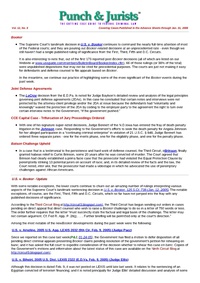Defendant was charged with five counts of killing witnesses while engaging in a drug-trafficking conspiracy, in violation of 21 U.S.C.S. § 848(e)(1)(A) and 18 U.S.C.S. § 2; and five counts of killing the same witnesses in furtherance of a continuing criminal enterprise, also in violation of 21 U.S.C.S. § …
This is a rare decision in which a conviction was reversed because the court found that the defendant was “clearly prejudiced” when she was jointly tried alongside an absent co-defendant, who absconded before trial. The defendant, Loretta Tarango, was the office manager for her co-defendant’s medical practice. Both defendants …
The defendant, Alfred Ameline, pled guilty to the possession of a detectible amount of methamphetamine. He was sentenced to 150 months in prison, based on the district court’s determination, by a preponderance of the evidence, that he was responsible for 1,603 grams of methamphetamine. Ameline strenuously objected to that …
The two defendants in this case, Charles LeCroy and Anthony Snell. were indicted for wire fraud after allegedly soliciting and obtaining from a lawyer (who was originally named a co-defendant but who subsequently died before trial) a false $50,000 invoice for legal services which the defendants then passed on …
Here the Court held that it was an improper delegation of judicial authority for the district court to allow the probation officer to determine the number of drug tests that the defendant was required to undergo during his term of supervised release, thus requiring a remand for resentencing.
On April 28, 1986, two days before the Supreme Court issued its landmark ruling in Batson v. Kentucky, 476 U.S. 79 (1985), jury selection began in the trial of Charles Brinson, an African American, for a murder that took place a year earlier in the bathroom of a Philadelphia …
This decision relates to the sentencing of an Egyptian convicted of terrorism financing; and it is noted principally for Judge Ellis’ detailed discussion and analysis of some of the sentencing questions not answered in Booker. For example, he noted that:
“neither reached nor addressed in Booker is the question …
This is another in a recent line of cases in which courts have held that the defendant in a capital case is entitled to more than one jury - a concept that the Government is fighting tooth-and-nail. (See, e.g., Judge Gertner’s recent decision in U.S. v. Green, 343 F. …
Although this is a pre-Booker Guideline case dealing with a downward departure based on family circumstances (a ground that U.S.S.G. § 5H1.6 says is “not ordinarily relevant” in determining whether the sentence should be outside the sentencing range called for by the Guidelines), it is a sentencing decision by …
